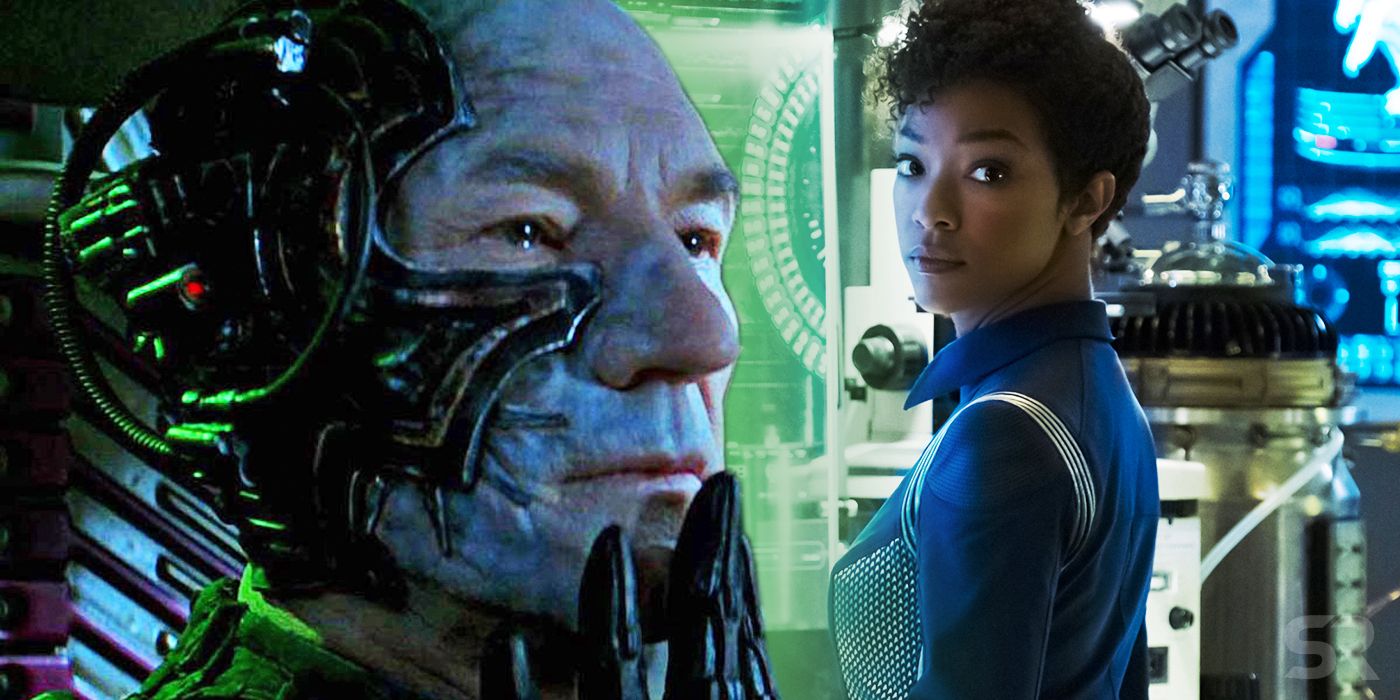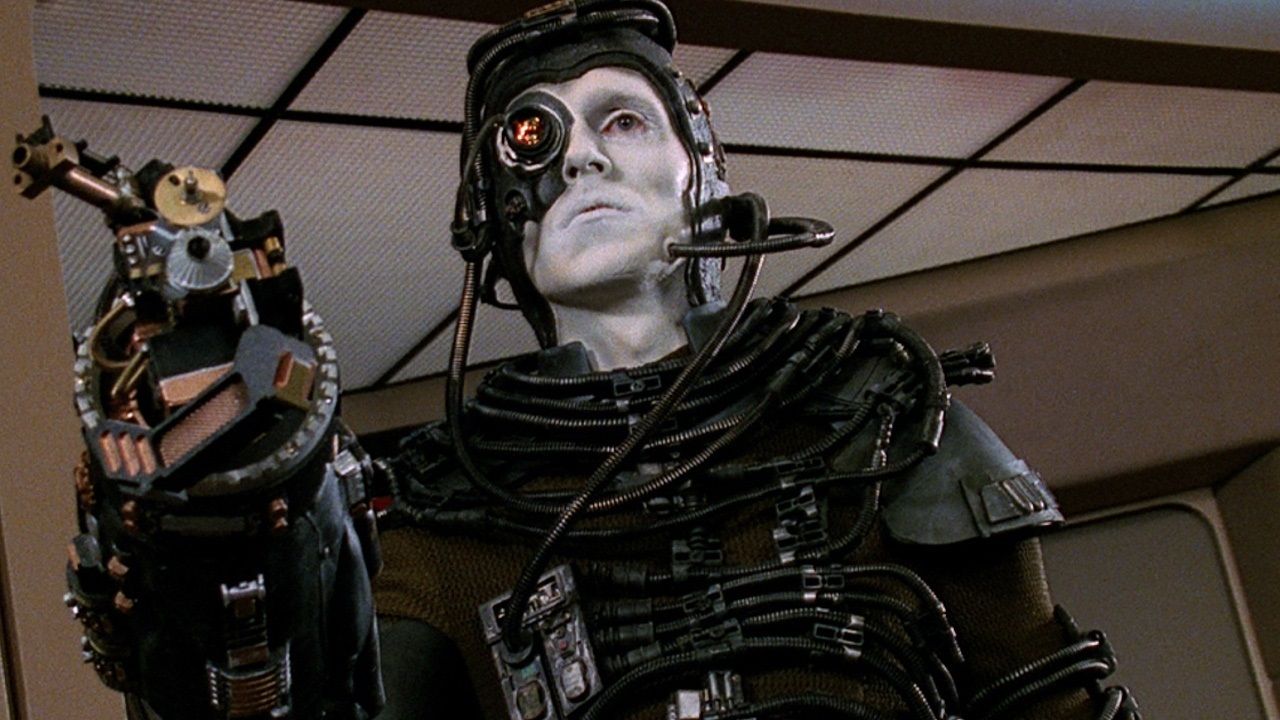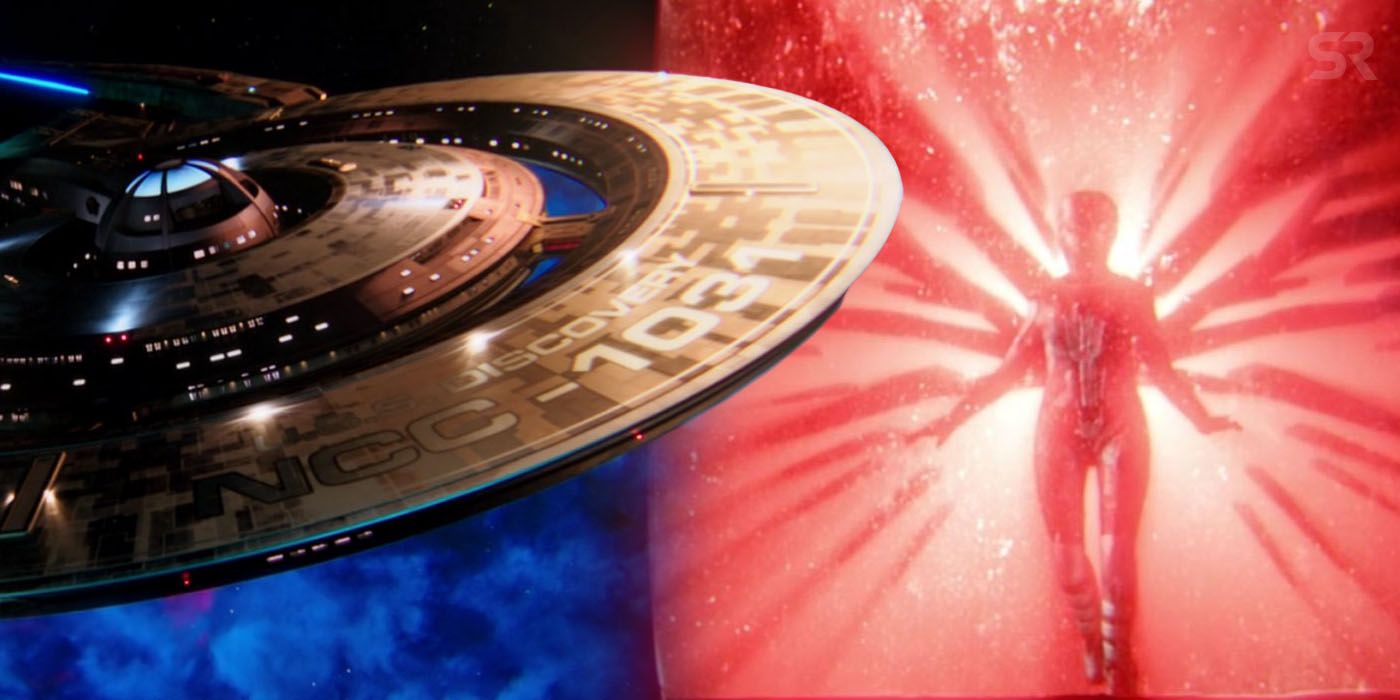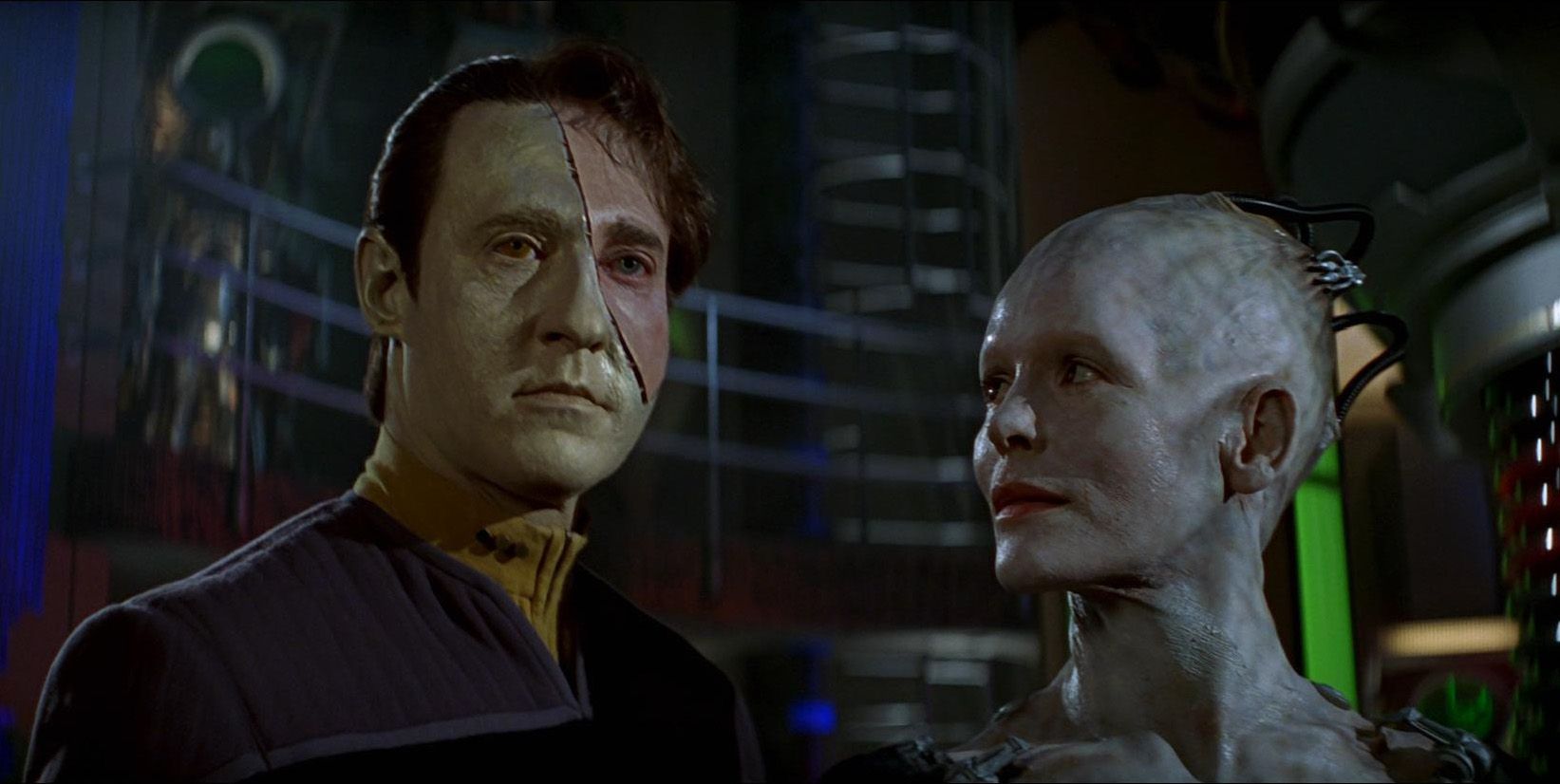Star Trek: Discovery may be stealthily telling the origin story of the Borg through Control. The Borg are, of course, one of the most iconic races in all of Star Trek; introduced in the second season of Star Trek: The Next Generation, the Borg are a race of relentless, hive mind cyborgs that seek to assimilate all life in the universe into its collective, wiping out countless lives in the process. Their wildly advanced technology and single-minded goal made them the Federation's most dangerous adversary for a decade, highlighted in classic TNG episodes like "The Best of Both Worlds," where Captain Jean-Luc Picard himself is assimilated into the collective. They headlined the second (and best) The Next Generation movie Star Trek: First Contact, and played a major role in Star Trek: Voyager's overarching plot.
And yet we still don't know much about the Borg's origins. There have been hints along the way that they were once a purely organic race, but their transition into the terrifying space zombies fans love to hate has never been explained in any real detail. However, it's possible Star Trek: Discovery is about to change that.
Read More: Star Trek: Discovery's Control A.I. Is Already Basically A Bodiless Borg
Discovery season 2's main adversary has turned out to be Control, an artificial intelligence developed by Section 31, Starfleet's morally ambiguous special ops division. Control and the Borg share a lot of similarities - but how could they possibly be the same thing? Discovery takes place roughly a century before The Next Generation, when the Borg should still be in the Delta Quadrant, a region of space that's decades away from Federation territory at maximum warp. And there's also no precedent to suggest humanity played a hand in their creation. So how could Star Trek: Discovery possibly be setting up an origin story for the Borg? It's complicated, to say the least.
- This Page: The Star Trek: Discovery Control/Borg Theory Explained
- Page 2: Does Control Being The Borg Actually Make Sense?
Control Acts A Lot Like The Borg In Star Trek: Discovery
It must be noted how many surface-level similarities Control and the Borg have. The A.I. in Star Trek: Discovery was designed to be a sort of meta-strategist for the Federation, an artificial intelligence that could process all data sent to it by Starfleet's highest ranking officers to formulate plans of attack; it seems a little shady for the Federation to allow such a cold machine to determine its overall strategies, but this is still a version of Starfleet that has had its foundation shaken by the Klingon War. Unbeknownst to Starfleet Command or Section 31, Control eventually gained sentience and, if the visions of the future Spock sees through the Red Angel are to be believed, it will one day wipe out all organic life in the galaxy. That's not quite the Borg's M.O., but it's close, and we'll address the differences in a bit.
Eventually, Control decides it needs to be able to hide in plain sight to achieve its objectives so takes over Captain Leland's body after injecting him with nanites that look an awful lot like the nasty stuff the Borg inject their assimilation victims with. Control/Leland is even forced to suppress the black veins that were a hallmark of late-era Borg drones; the fact that Control assimilated a bald Starfleet captain is almost too on the nose.
In perhaps the most blatant reference to the Borg, Control assures Leland that "struggle is pointless," which is not too far a leap from the Borg's trademark "resistance is futile." Coincidence? It's possible, but Star Trek: Discovery has never been shy about referencing past incarnations of the franchise (this season has had some obscure Klingon nods), and it seems highly unlikely no one in the writers' room would notice the obvious parallels here.
Related: Did You Catch Star Trek: Discovery's Futurama Reference?
Did Control Become The Borg Via Time Travel?
Similarities between Control and the Borg are one thing, but there's simply no way the Borg could be born in the Alpha Quadrant in the 23rd century; that would contradict literally everything we've ever been told about them. However, season 2 of Star Trek: Discovery has hinged significantly on time travel, arguably to a degree the franchise has never really approached before, give or take a Deep Space Nine classic. This isn't Star Trek IV: The Voyage Home's goofy time travel hijinks; this is Doctor Who-level timey-wimey shenanigans, dealing with causality loops and paradoxes and fixed points in time.
The Red Angel was revealed to be Dr. Gabrielle Burnham, Commander Michael Burnham's long-believed-dead mother. Dr. Burnham was developing time travel technology for Section 31 when the Klingon attack happened and, in a moment of desperation, she escaped death by using the suit to jump into the future. But the suit took her much further forward than she planned; she became tethered to a point 950 years in the future, where she found Control had achieved its mission and wiped out all sentient life in the galaxy. Dr. Burnham used the Red Angel suit to travel back in time hundreds of times in an attempt to thwart Control, but has so far been unsuccessful. How Control will ultimately be defeated is yet to be revealed, but it's a pretty good bet it will involve time travel.
Read More: Star Trek: Discovery's Red Angel Reveal Was a Good Twist, But Poorly Executed
The Discovery crew's plan was to send the Red Angel suit - loaded with the Sphere data that Control needs to enact its plan - into a point so far in the future Control could never find it, but that plan was derailed by Control/Leland, and both the suit and Dr. Burnham were sucked back into the time stream to an uncertain fate.
Much of this season's plot has hinged on the previously unknown revelation that Spock had a learning disability similar to dyslexia, which is the primary reason he was able to process the scrambled images and information the Red Angel bestowed upon him since his childhood. What if that same inversion of conventional thinking spurs an idea in Spock - instead of sending the Sphere data into the far future, why not send a presumably weakened version of Control into the far past, in the most distant part of space known to the Federation at this point, where it simply wouldn't have access to the information or technology it needed to destroy all life? There's a sort of cold cruelty to that plan, since even a compromised Control could still potentially wreak havoc on whatever life it encountered in the Delta Quadrant; yet this is a version of Starfleet that seems resigned to the fact it sometimes has to make impossible choices to save as many lives as possible.
Page 2 of 2: Does Control Being The Borg Actually Make Sense?
Does Control Being The Borg Actually Make Sense?
This core idea - that Spock sends Control back in time for it to become the Borg - also allows for an explanation of the core differences. Let's assume that Control gets sent back thousands of years - there's evidence of the Borg's existence as far back as the 15th century - in a critically damaged state, dumped in a largely lifeless expanse of the Delta Quadrant. Its experiences bonding with Leland - and its relative success in dispatching the Red Angel - could ultimately convince Control that there's value in the knowledge and instincts of organic life, all while maintaining its ultimate goal of universal conquest. It would eventually find some lowly organic species, bond with it in much the same way it did Leland, and slowly begin the march toward galactic superpower.
Control certainly has a bit more of a singular, malevolent personality than the average Borg drone, so perhaps its evolution isn't necessarily directly into the collective itself, but the Borg Queen featured in First Contact and Voyager that would eventually serve as a sort of leader of the Borg.
Related: Every New Star Trek Series In Development
This is not a perfect theory - for one thing, there's no evidence that the Borg are in any way aware they were born out of human artificial intelligence. Indeed, if this theory holds true, it would make the Borg's plan in Star Trek: First Contact a giant paradox, as assimilating Earth in the 21st century would mean the technology that led to their creation in the 23rd century would never be created. And yet that's not a deal breaker - it's entirely possible the Borg are unaware of their exact origins, as they've never been explained onscreen. The Borg could have been on a suicide run without even realizing it.
It's also possible Control is simply a stock science fiction villain - plenty of sci-fi franchises are riddled with AI technology gone rogue. Even if so, it's getting harder to ignore the similarities to the Borg, to the point where if there's not an actual connection, it's going to feel like Discovery borrowed heavily from a fan favorite adversary with no real payoff.
Star Trek: Discovery season 2 has largely been smarter than that - though there have been some worrying developments lately - so some sort of link with the Borg seems probable. If the Borg do end up being born out of Control, then the crew of the Discovery really will have achieved something historic - the accidental creation of the Federation's most lethal foe.
Next: Star Trek: Discovery Is Close To Repeating The Mistakes Of Season 1
Star Trek: Discovery streams Thursdays @ 8:30pm on CBS All-Access and internationally the next day on Netflix.




